Georgiy Sudakov interview: Our victories can be break from grief for Ukrainian people
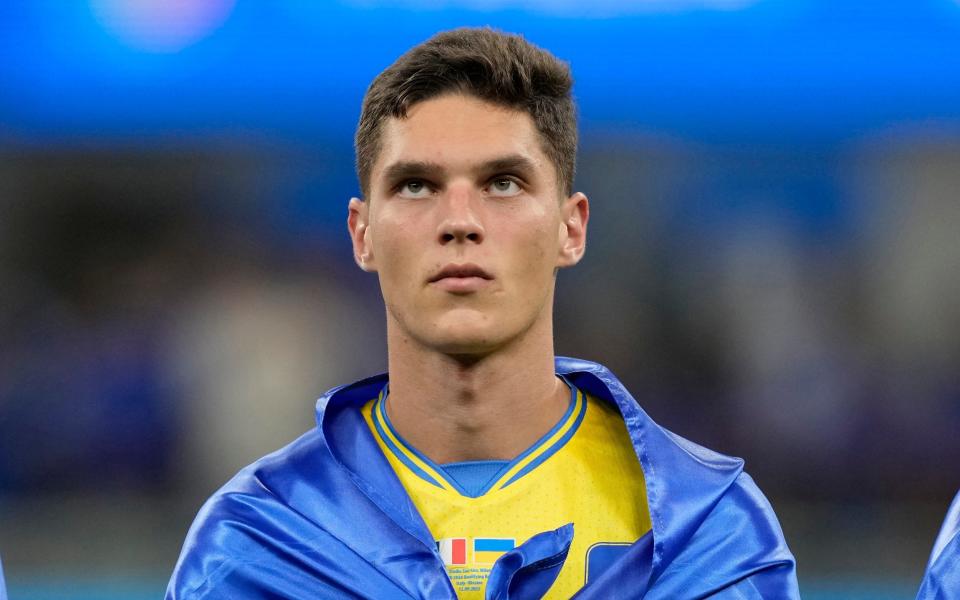
Whether it is the troops who wrote to him after Ukraine’s qualification for Euro 2024, the opportunity to give the people of his country respite from the grief they have suffered or his own future, Georgiy Sudakov knows the European Championship will be like no other for him and his team-mates.
The tournament in Germany is the first Ukraine will compete in since the invasion by Russia in 2022 and Shakhtar Donetsk midfielder Sudakov is the poster boy of a country whose spirit and pride has so far proved to be unbreakable.
Ukraine had to play their ‘home’ games in qualifying outside their own country, with Chelsea winger Mykhailo Mudryk scoring the goal in the Polish city of Wroclaw that earned a play-off victory over Iceland and caused celebrations on the front line.
Sudakov says: “Many soldiers wrote to me, they thanked us for this victory and were incredibly happy. They are the ones out there fighting for a more peaceful world. I thank them for their service and pray for their safe and fast return home.
“It was incredible [to qualify]. We fought very hard for our people and for our country to get a spot at the Euros. The fact that we managed to reach that goal fills us with immense pride and joy. I can’t wait to represent Ukraine.”
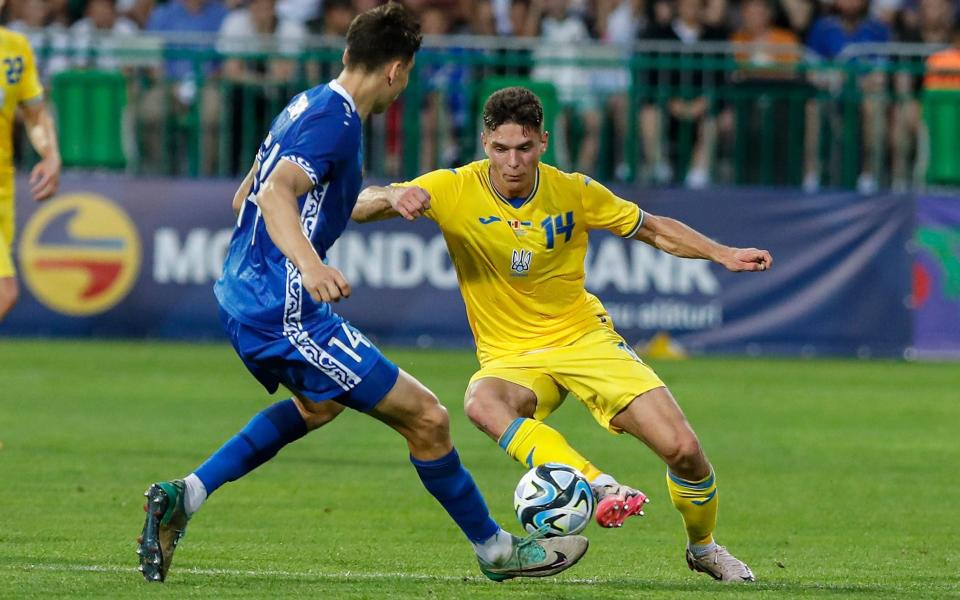
Sudakov and his team-mates start their campaign against Romania on Monday, and will also play Slovakia and Belgium in the group stage.
“I am sure that our victories can be a break from all the grief that our people are feeling,” says 21-year-old Sudakov. “We’re hoping to bring as many positive results as possible, but we cannot think about the knockout stages yet. We’re focused on the first game against Romania, nothing else.
“First of all, this is an opportunity to show our courage and unity, to show once again to the whole world that there is a war going on in our country. Russia’s invasion has caused a lot of fear and grief to our people, and the fact that we can provide a source of happiness and pride with our achievements gives us even more motivation to represent our flag.”
Sudakov was forced to huddle in a makeshift bomb shelter with wife Yelyzaveta under their parents’ home in Kyiv when Russia first invaded and life as an international footballer has not shielded him from the impact of war.
With commercial planes unable to fly in and out of Ukraine, Yelyzaveta has had to make alternative travel plans to watch her husband at the Euros this summer.
“My wife is planning to come to two games,” says Sudakov. “They will first travel to Warsaw by train and then by plane [to Germany]. I don’t know if the families of all of the other players will make it to the games.”
As well as the support from their homeland, Ukraine will receive the backing of fans of other countries. But Sudakov is insistent the team must not pay too much attention to the well wishes of the majority of Europe.
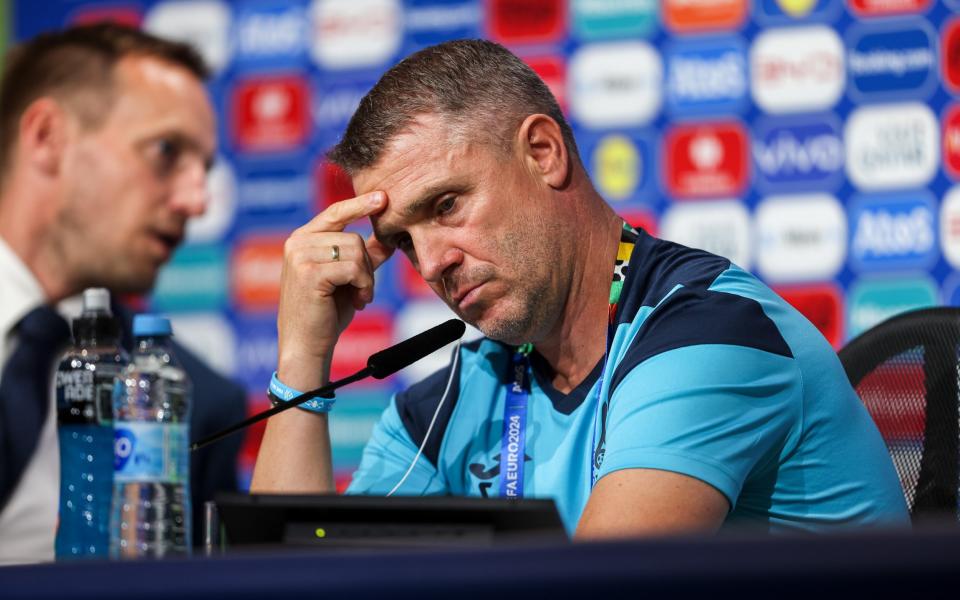
“We try not to put too much focus on that,” he said. “We give our best on the pitch for all our fans and all the support is welcome.
“I understand that maybe there is special attention and support for our country given the circumstances, but we must first prove ourselves on the football pitch.
“We have ambition and we want to show why we’ve qualified for this tournament. All we can do is to promise that we will do our best to win our matches.”
In an interview with Telegraph Sport last year, Sudakov compared his style to that of Manchester City’s Phil Foden, the Premier League Player of the Season, and Tottenham Hotspur’s James Maddison.
His profile soared this season after starring for Shakhtar in a famous Champions League victory over Barcelona. Sudakov is widely tipped to be the next big export out of Ukraine, having already been linked with Arsenal, City and Chelsea, and expects to play in one of Europe’s biggest leagues next season.
“I see myself in the top five European leagues, but I cannot name a specific club,” he says. “I understand that it is an incredible opportunity to prove myself, I am preparing mentally and physically. I hope I can show everything I am capable of.
“Of course, I understand that my future depends on this tournament. But for that, I need to be at a high level in the Euros. Therefore, I’m going to focus on the tournament first and then see what happens after that.”
The Euros will also give Sudakov’s close friend and team-mate Mudryk the chance to shine following a difficult 18 months at Chelsea after moving to England from Shakhtar.
Asked if Mudryk has a point to prove in Germany, Sudakov replies: “One hundred per cent. Misha is an incredible football player, I think he will do his best in this tournament.”
In terms of when Chelsea fans might see the best of Mudryk, Sudakov adds: “I think it is a matter of time. Soon you will see everything.”
This Euros will mean more to Ukraine than any other country
“For 90 minutes, we can forget.”
To Oleksandr Sarzhevskyi, one of around 150,000 Ukrainians residing in the United Kingdom, the coming weeks will transcend sport. Ukraine begin their European Championship campaign against Romania on Monday. It will be both a moment of solace for the nation and a chance to continue to make their case to the world.
“It’s a very important moment,” says Sarzhevskyi, while wearing a t-shirt emblazoned with the Ukrainian coat of arms – a yellow trident against a blue shield. “Everyone will either be watching this game or following the score, whether they’re at home or on the front line.”
Many of those in the UK will gravitate towards enclaves such as the Ukrainian Social Club, where I met Sarzhevskyi and his friends to watch the country’s recent friendly with Poland. Tucked away in a basement in Holland Park, the social club is a hub for Ukrainians in London. It stages events for children, live music and talks about Ukraine, including by current soldiers. Yet perhaps never is it more alive than for big national team fixtures.
Since February 24, 2022, the day that everything changed forever, March 26 this year was one of Ukraine’s happiest occasions. With a come-from-behind 2-1 victory in the qualification play-off match against Iceland, Ukraine sealed their spot in Euro 2024.
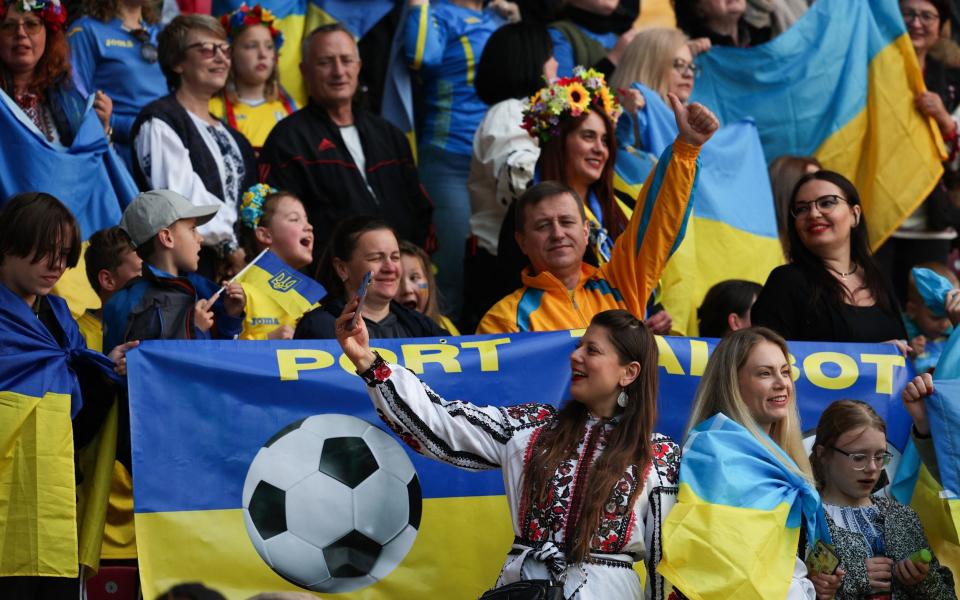
Among those packed into the social club that evening was Dmytro Semonov, a 30-year-old internet marketer who was living in Turkey when the war broke out. “We were crying with joy, hugging complete strangers,” he recalls. “We felt united.”
Even in moments of jubilation, the war is inescapable. At the back of the bar at the social club, nestled behind packs of crisps, is a photo of one former regular patron here. He was killed in action by Russian troops last year.
‘Sometimes drunk, but more happy than drunk’
Ukraine’s last appearance in a major tournament was at Euro 2020. Sarzhevskyi was among those watching in central square in Kyiv when a last-minute goal in extra time against Sweden led Ukraine to the quarter-finals, for the first time in their history.
“You’re with a crowd, and that makes you even happier – because you see so many happy faces,” Sarzhevskyi recounts over potato dumplings and borscht – red beetroot soup, a national staple. He smiles. “Sometimes drunk, but more happy than drunk.”
He has since seen Artem Dovbyk’s 121st-minute goal, “100 times, 200 times. Even today, when I watched it again, I felt so happy.” Now, “it feels like it was in a previous life”.
One of Sarzhevskyi’s friends, Artem, who watched with him that night in Kyiv recently sent him a WhatsApp message about this summer’s Euros. “He told me that he’ll be watching from the front line. He’s very close to Russians – 500 metres to one kilometre. They’re hiding in the forest. But they’re still watching the games.”
Sarzhevskyi, who is 30, could have been among the Ukrainians fighting. In December 2021, while working in Kyiv, he got an offer to relocate to Alanya, in south Turkey, with his company, where he works as a project engineer. Observing Russia’s deployment of troops near the Ukrainian border, Sarzhevskyi had a growing sense that war was coming. In February 2022, he returned home briefly. He left on February 13, 11 days before the invasion. Later in 2022, Sarzhevskyi and his wife relocated to London; they are prominently involved in charities that raise money and equipment for troops.
“As Ukrainians, sometimes we can show that we are happy, but we cannot be 100 per cent happy because of what is going on in the country. We have lots of friends and family who either died, were injured or are on the front line.”
Sarzhevskyi’s sister’s husband is among those who have been killed. He has become almost numb to the horror of loss. “After the second, third, fourth story, you’re not feeling the same emotions as the first time.”
Part of the value of football is as distraction – an area of life that remains to argue over the trivial. At the social club, Sarzhevskyi and his friends gently moan about Mykhailo Mudryk’s show-boating. As Poland expose flaws in Ukraine’s defence, ultimately winning the friendly 3-1, Sarzhevskyi declares “it’s very good that we lost, because it’s a good lesson learned.” His wife Valentyna laughs.
‘We need to shout about it every day’
Valentyna never previously cared about Ukraine’s results. Since the invasion, she has come to see the national team in a new light. “Whenever we can show that we are together and feel united as a country, and be against Russia, it’s important,” she explains.
If the national side are a galvanising force, perhaps this helps to explain their remarkable resilience on the pitch. Ukraine’s team have turned the comeback into an art form. In the first Euro 2024 play-off in March, away against Bosnia and Herzegovina, Ukraine trailed 1-0 until the 85th minute; then, two goals in four minutes sealed progressed to the next stage. They trailed again in the second and final play-off, played out in front of fiercely partisan Ukrainian fans in the Polish city of Wroclaw, until Mudryk’s 84th-minute winner against Iceland.
The euphoric celebrations were inextricably tied to the war. “I’m very proud to be Ukrainian, to be of the same blood as those who are now giving their lives for our freedom,” declared Oleksandr Zinchenko, Ukraine’s captain, who has donated over £1million to refugees and the war effort. “We need to talk about it, shout about it every day. This is the only way we can win.”
After qualification, Ukraine’s president, Volodymyr Zelenskyy, hailed the team “for proving once again that when Ukrainians face challenges but refuse to give up and continue the fight, they invariably win”. Players have been exempt from conscription, a recognition of the team’s significance to the country.
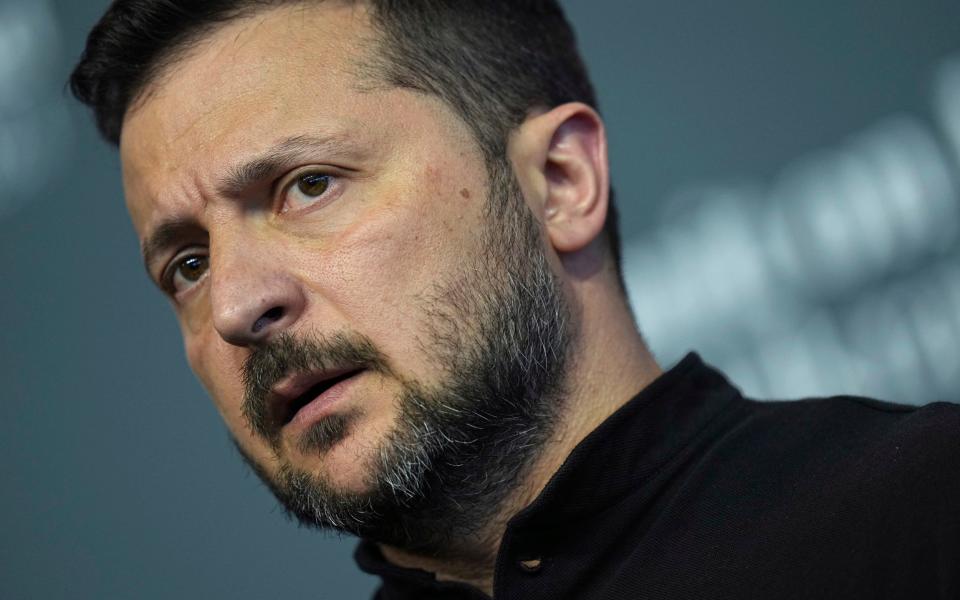
Ukraine’s official announcement of their squad for the Euros featured soldiers and ordinary citizens speaking the players’ names. All the words were in Ukrainian; before the war, they probably would not have been. Until 2022, players and the manager normally spoke Russian in public. Now, the team no longer speaks to the media in Russian at all – even those, like the manager, Sergei Rebrov, who hails from Donetsk Oblast, where Russian was the most-spoken language before the war.
The shift reflects the broader change among Ukrainians. Valentyna and her husband used to speak “everything” in Russian. “Now, nothing. It’s two years that I don’t speak Russian at all – with my family, friends, Oleks, at home. Never.” Anyone buying a round at the bar at the social club will be met by a sign. It translates as: ‘Please speak Ukrainian – we do not support the language of the terrorist aggressor and occupier.’”
For Ukraine, the national football team is both as affirmation of the country’s values and an outlet to reach the rest of the world. In every game since February 2022, Ukraine’s players all come out draped in the national flags; they will continue to do so at the European Championship. Before the match against Iceland, an outline of Ukraine on a giant flag laid across the pitch included Crimea within the country’s borders.
Players regularly wear special t-shirts under their main kit, including one calling upon Russia to free the defenders of Azovstal, who guarded the steel plant during the Siege of Mariupol in 2022. Such shirts might be seen at the Euros, when players score goals and remove their team jerseys in jubilation. “When they score a goal,” Sarzhevskyi says, “they can send a message to the whole world.”
‘Football has a role to play in the war’
“What is happening now in football is a great pride for Ukrainians and also an opportunity to remind the world about the unjust war,” says Yulia Dovhan, who speaks to me from her town near Lviv. Together with her mother and two sons, Dovhan fled Ukraine after Russia’s invasion, moving to Aldeburgh in Suffolk. They returned to western Ukraine last year, rejoining her husband.
“It is a great support for Ukraine when people even just talk about us. This means that they have not forgotten about Ukraine and what is happening there now.”
Dovhan sometimes helps her husband, who teaches in a local school. “Sport is a favourite lesson for children, especially football. Although Russia has taken away a happy, carefree childhood from children, schoolchildren still gather at a small stadium to play at least a little and have fun. Due to frequent air alarms and dangers, this does not happen often. We often organise charity matches where children collect money to help the military.”
Olga Onuch, a professor in Ukrainian politics and the University of Manchester, also believes that the national team have come to represent something greater than themselves.
“Football undoubtedly has a role to play in the war,” she says. “Qualifying for the knock-out round would certainly be a boost for ordinary citizens and Ukraine.”
Onuch cites her mother phrase’s ‘each one of us in our own way are working together for a collective cause’. “Whenever the Ukrainian fighting spirit and emotional commitment to the cause is on display the world sees Ukrainians for who they are – a nation who gallantly defends its people who seek only liberty,” Onuch says. “Be it on the pitch, at school, or on the battlefield, Ukrainians are all working to stop Russian aggression and rebuild their country.”
Semonov even thinks that success on the pitch would make Ukrainian victory in the war more likely. “Every win, every mention of Ukraine is very important for us to keep our voice in the international arena. We use every sporting event to deliver the message that we appreciate the support of the international community.”
Yet while sport can provide a certain release, it is also the cause of much Ukrainian fury. Football’s governing bodies have barred Russian teams from competing in international tournaments. But Russian athletes are free to participate in the Olympics, as well as tennis grand slams, where they are considered ‘neutral’ and not aligned to any country.
“We are angry about it,” says Semonov. He sees the presence of Russian athletes in the Games as an insult to the over 400 Ukrainian athletes and officials who have been killed in the war. “It is another channel for Russia to deliver their propaganda. The Olympic Committee just helps them to do it. If you don’t punish a bully, he will just take even more.”
For all his pride in what the Ukrainian football team have already achieved, Semonov believes that there is much more to come over the coming weeks in Germany.
“They know they are not just playing for fun, not just for some football cup. They are actually playing for Ukraine, they contribute a lot to our survival. They will be very motivated and will put a lot of effort in to win.”
Sarzhevskyi and a group of other Ukrainians will be in Düsseldorf on June 21, seeing Ukraine face Slovakia. They will be going less to support a team than a cause.
“It’s very important in such hard conditions to have those small wins. Ukraine has its strongest team for 30 years – they’ve never been as strong as now. So expectations are quite high.
“We need to tell the world that Ukraine is fighting, Ukraine is winning, and Ukraine is capable of winning.”

 Yahoo Sports
Yahoo Sports 
